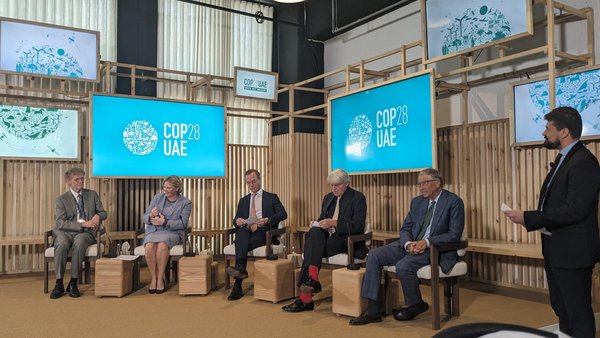 Read this article in French
Read this article in French- Share this article
- Subscribe to our newsletter
CGIAR launches a new investment case to support its future research portfolio
At COP28 in Dubai/United Arab Emirates, investments in support of CGIAR’s new investment case were announced on December 1st. For the first time ever, a COP summit placed the future of agriculture at the heart of climate discussions.
At a pledging event hosted by the UAE, funders shared commitments including 136 million US dollars from the Netherlands, USD 132 million from the United Kingdom, USD 100 million from the United States, USD 100 million from the World Bank and USD 51 million from Norway. These pledges followed another announcement of a USD 200 million partnership to Accelerate Action on Climate and Strengthen Food Systems Through Investment in Agricultural Innovation by the UAE and the Bill & Melinda Gates Foundation.
CGIAR released a comprehensive new case for USD 4 billion in investments toward the organisation’s 2025-2027 research portfolio, laying out the scope of the food and climate crises and the vital importance of increased investment in agricultural R&D. For every US dollar invested in agricultural research and development, investors see up to ten US dollars worth of benefits to smallholder farmers, vulnerable communities and ecosystems.
“At COP28, we made an impressive breakthrough, placing food systems and agriculture at the heart of the agenda for the first time in the history of COP,” said HE Mariam bint Mohammed Almheiri, UAE Minister of Climate Change and Environment. “The endorsement secured by over 134 leaders to the ‘COP28 UAE Declaration on Sustainable Agriculture, Resilient Food Systems, and Climate Action’ highlights our collective resolve to galvanise action that will benefit millions of farmers.”
Climate change is fuelling the largest food crisis in modern history
More than 780 million people are affected by hunger, a number that is expected to grow significantly with every degree the world warms. Agriculture is both a major contributor to climate change, producing almost a quarter of global greenhouse gas emissions, and deeply affected by it – global agricultural productivity growth has slowed by nearly 21 per cent in the past 60 years due to climate change. But by focusing on science, food systems can transform from a source of emissions to a sink for carbon, from fuelling environmental degradation to supporting regeneration and from displacing biodiversity to protecting it, CGIAR notes in a press release.
For over 50 years, CGIAR has delivered the science, innovation and partnerships to tackle humanity’s greatest challenges. Bringing together 13 research institutions across the globe, CGIAR’s decades of experience have already yielded critical progress towards food and nutrition security for all.
To meet the size and scale of the overlapping food and climate crises, CGIAR’s 2025-2027 research portfolio will support scientists, experts and partners around the globe to expand and scale world-changing innovations – from new tools and technologies for food producers, such as AI-enabled apps to diagnose diseases in plants, to more nutritious and climate-resilient crops like bio-fortified sweet potatoes, next-generation cassava and scuba rice.
(CGIAR/wi)
More information:





Add a comment
Be the First to Comment